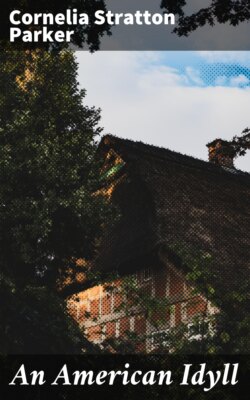Читать книгу An American Idyll - Cornelia Stratton Parker - Страница 5
CHAPTER I
ОглавлениеSuch hosts of memories come tumbling in on me. More than fifteen years ago, on September 3, 1903, I met Carl Parker. He had just returned to college, two weeks late for the beginning of his Senior year. There was much concern among his friends, for he had gone on a two months' hunting-trip into the wilds of Idaho, and had planned to return in time for college. I met him his first afternoon in Berkeley. He was on the top of a step-ladder, helping put up an awning for our sorority dance that evening, uttering his proverbial joyous banter to any one who came along, be it the man with the cakes, the sedate house-mother, fellow awning-hangers, or the girls busying about.
Thus he was introduced to me—a Freshman of two weeks. He called down gayly, "How do you do, young lady?" Within a week we were fast friends, I looking up to him as a Freshman would to a Senior, and a Senior seven years older than herself at that. Within a month I remember deciding that, if ever I became engaged, I would tell Carl Parker before I told any one else on earth!
After about two months, he called one evening with his pictures of Idaho. Such a treat as my mountain-loving soul did have! I still have the map he drew that night, with the trails and camping-places marked. And I said, innocence itself, "I'm going to Idaho on my honeymoon!" And he said, "I'm not going to marry till I find a girl who wants to go to Idaho on her honeymoon!" Then we both laughed.
But the deciding event in his eyes was when we planned our first long walk in the Berkeley hills for a certain Saturday, November 22, and that morning it rained. One of the tenets I was brought up on by my father was that bad weather was never an excuse for postponing anything; so I took it for granted that we would start on our walk as planned.
Carl telephoned anon and said, "Of course the walk is off."
"But why?" I asked.
"The rain!" he answered.
"As if that makes any difference!"
At which he gasped a little and said all right, he'd be around in a minute; which he was, in his Idaho outfit, the lunch he had suggested being entirely responsible for bulging one pocket. Off we started in the rain, and such a day as we had! We climbed Grizzly Peak—only we did not know it for the fog and rain—and just over the summit, in the shelter of a very drippy oak tree, we sat down for lunch. A fairly sanctified expression came over Carl's face as he drew forth a rather damp and frayed-looking paper-bag—as a king might look who uncovered the chest of his most precious court jewels before a courtier deemed worthy of that honor. And before my puzzled and somewhat doubtful eyes he spread his treasure—jerked bear-meat, nothing but jerked bear-meat. I never had seen jerked anything, let alone tasted it. I was used to the conventional picnic sandwiches done up in waxed paper, plus a stuffed egg, fruit, and cake. I was ready for a lunch after the conservative pattern, and here I gazed upon a mess of most unappetizing-looking, wrinkled, shrunken, jerked bear-meat, the rain dropping down on it through the oak tree.
I would have gasped if I had not caught the look of awe and reverence on Carl's face as he gazed eagerly, and with what respect, on his offering. I merely took a hunk of what was supplied, set my teeth into it, and pulled. It was salty, very; it looked queer, tasted queer, was queer. Yet that lunch! We walked farther, sat now and then under other drippy trees, and at last decided that we must slide home, by that time soaked to the skin, and I minus the heel to one shoe.
I had just got myself out of the bath and into dry clothes when the telephone rang. It was Carl. Could he come over to the house and spend the rest of the afternoon? It was then about four-thirty. He came, and from then on things were decidedly—different.
How I should love to go into the details of that Freshman year of mine! I am happier right now writing about it than I have been in six months. I shall not go into detail—only to say that the night of the Junior Prom of my Freshman year Carl Parker asked me to marry him, and two days later, up again in our hills, I said that I would. To think of that now—to think of waiting two whole days to decide whether I would marry Carl Parker or not!! And for fourteen years from the day I met him, there was never one small moment of misunderstanding, one day that was not happiness—except when we were parted. Perhaps there are people who would consider it stupid, boresome, to live in such peace as that. All I can answer is that it was not stupid, it was not boresome—oh, how far from it! In fact, in those early days we took our vow that the one thing we would never do was to let the world get commonplace for us; that the time should never come when we would not be eager for the start of each new day. The Kipling poem we loved the most, for it was the spirit of both of us, was "The Long Trail." You know the last of it:—
The Lord knows what we may find, dear lass,
And the Deuce knows what we may do—
But we're back once more on the old trail,
our own trail, the out trail,
We're down, hull down, on the Long Trail—the
trail that is always new!
